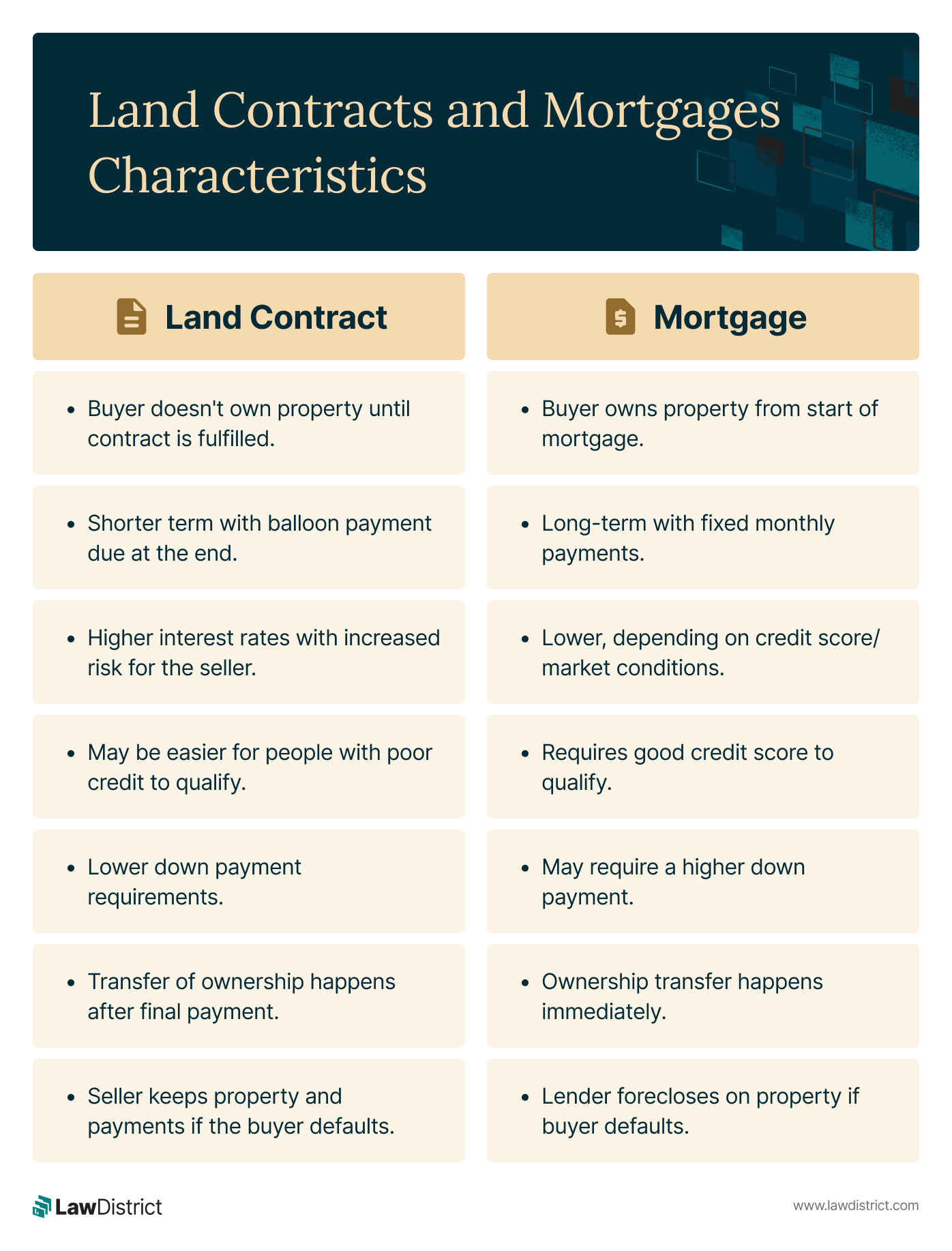Many similarities exist between a land contract and a mortgage. Both require monthly principal and interest payments, as well as a down payment. There are, however, significant differences between the processes of acquiring either type of contract, with land contracts being easier to get.
The legal status of your home is also different under a contract because you do not own it. Land contracts are an excellent way to buy a home if you do not qualify for a mortgage. Besides, the contract is between you and the seller, giving you more negotiating power.
A mortgage works like other types of loans. The lender lends the borrower money for a certain period, which they must repay with interest. Mortgages, however, are different because they are secured. Lenders obtain a hold over the property and can foreclose if the borrower fails to pay.
Mortgage loans can be used to buy or refinance any real estate or borrow against an existing property's value. The property provided serves as collateral for the loan. Lenders will assess the collateral provided to determine how much the borrower can borrow. But which is better?
Advantages and Disadvantages of Land Contracts
Land contracts, land purchase agreement forms, and contracts for deed or installment sales are agreements where the property owner agrees to relinquish ownership of the property once you complete your obligations. In most contracts, there is a monthly payment and a balloon payment at a later time.
Land contracts' specific advantages and disadvantages may vary depending on the contract terms and circumstances. Here are several advantages and disadvantages of land contracts:
Advantages of land contracts
- Credit: With land contracts, you can buy a property you might not otherwise qualify for with traditional financing if you have poor credit.
- Interest rate: Negotiating a lower interest rate with a land contract than a traditional mortgage is possible, potentially saving you money.
- Payment: A land contract may allow for smaller, more frequent payments or the opportunity to pay off the contract early without penalty.
- Ownership: A land contract gives the buyer immediate ownership of the property. The seller can use a quitclaim deed to show the buyer's interest in the property, especially if it's family.
Disadvantages of land contracts
- Credit: Even if a poor credit score does not prevent you from entering into land contracts, it may result in higher interest rates.
- Interest rate: You may pay a higher interest rate with land contracts since they are not regulated like traditional mortgages.
- Payment: Payments on land contracts are often higher and shorter than those on traditional mortgages, making them difficult for some buyers to afford.
- Ownership: Sellers retain ownership of the property until the buyer pays off the full amount of the land contract, so if the buyer falls behind on payments, they may lose it.
Advantages and Disadvantages of Mortgages
Mortgages have advantages and disadvantages that vary depending on the individual loan's terms and the borrower's circumstances. Before accepting a mortgage, anyone considering one should carefully review and understand the terms of the loan.
Mortgages have some potential advantages and disadvantages, including:
- Credit: Most lenders offer mortgages to borrowers with a higher credit score, and a higher score may result in a lower rate.
- Interest rate: Because the collateral for the loan is the purchased property, mortgages typically carry lower interest rates than other types of loans.
- Payment: The length of mortgage terms can result in lower monthly payments and make home ownership more affordable for many people.
- Ownership: The borrower can then sell or use the property as collateral for another loan after repaying the mortgage.
Disadvantages:
- Credit: With poor credit, you may have difficulty qualifying for a mortgage or only qualify for mortgage loans with a higher interest rate and fewer favorable terms.
- Interest rate: Despite mortgage interest rates being generally lower than other types of loans, some factors, such as credit score and down payment size, can cause them to be relatively high.
- Payment: Longer mortgage terms can reduce monthly payments and result in borrowers paying more interest over time. Further, a borrower who falls behind on payments risks losing their property to foreclosure.
- Ownership: Banks and lenders retain ownership of properties until the mortgage is fully repaid, and they may restrict how you use the property.
Difference Between Land Contracts and Mortgages
Now that we’ve outlined the advantages and disadvantages of each type, the following table will outline the major differences between these two types of agreements.

Examples of Land Contracts and Mortgages
A land contract and a mortgage are legal instruments used in real estate transactions, but each has its applications and benefits. Here are examples of when to use each option:
Land contract examples:
- If the buyer has poor credit, it may be challenging to obtain a traditional mortgage. But considering that the seller acts as the lender and may be more flexible with credit requirements, a land contract might be a viable option.
- A land contract may be a better option if the property has some issue that makes it difficult to get a traditional mortgage, like zoning violations or an absence of a certificate of occupancy.
- If the buyer can't afford a large down payment: Unlike a traditional mortgage, a land contract can allow the buyer and seller to negotiate the down payment amount.
Mortgage examples:
- In the case of good credit, a buyer might get a traditional mortgage with a lower interest rate than what would be offered to them in a land contract.
- A traditional mortgage may be the best option if the property has a clear title, meaning there are no liens or other issues. In most cases, lenders require a clear title to protect their investment.
- If the buyer has a large down payment, they may qualify for a traditional mortgage with a lower interest rate. Because the lender will see the buyer as less likely to default, the lender will approve the loan.
Final Summary
A land contract might be an option if you don't qualify for a conventional mortgage. It may be possible to negotiate more flexible terms since the contract is between you and the seller. But take the time to weigh all the pros and cons with a professional land contract guide from Lawdistrist.
Start Your Land Purchase Agreement Form Now
Helpful Resources:
IRS - Home Mortgage Interest Deduction



